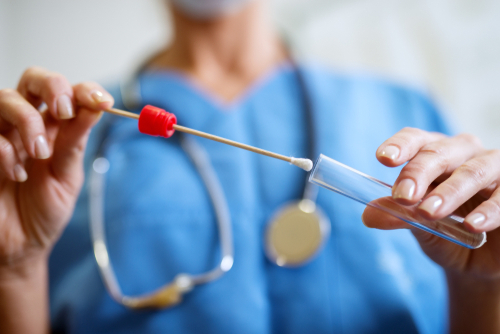
President Donald Trump on Friday declared the coronavirus pandemic a national emergency, a move that will allow the federal government to tap into billions of dollars in aid to help combat the spread of the virus.
The national emergency declaration will allow up to $50 billion in government funds to be accessed for additional support and Trump said that the Department of Health and Human Services would be allowed to waive certain regulations and laws to speed treating patients.
“No resource will be spared,” Trump said during a speech from the White House Rose Garden.
The U.S. Food and Drug Administration (FDA) also took two actions on Friday to tackle the novel coronavirus. The FDA issued an emergency use authorization (EUA) for Roche’s test for SARS-CoV-2, the virus that causes COVID-19. The FDA also said it will allow the New York State Department of Health the ability to authorize certain labs for patient testing.
The government’s actions on Friday follow statements from health officials and lawmakers this week that the U.S. government’s current system for testing coronavirus is failing.
Roche said that the first commercial test for SARS-COV-2 will enable speedier coronavirus testing. Roche intends to expedite test development to support the rising need for patient testing at early stages of infection. It works with swab samples that meet appropriate criteria for testing and is meant for either hospitals or reference labs, which can run the test on Roche’s fully automated systems.
“We have been encouraging test developers to come to the FDA and work with us,” Dr. Jeff Shuren, director of the FDA’s Center for Devices and Radiological Health, said. “Since the beginning of this outbreak, more than 60 developers have sought our assistance with development and validation of tests they plan to bring through the Emergency Use Authorization process. Additionally, more than 30 laboratories have notified us they are testing or intend to begin testing soon under our new policy for laboratory-developed tests for this emergency.”
This marks the third EUA given for a COVID-19 diagnostic test. It was granted within 24 hours of the application being received. Roche states the test will be able to provide test results in three and a half hours.
“It is important to quickly and reliably detect whether a patient is infected with SARS-CoV-2,” Thomas Schinecker, CEO of Roche Diagnostics, said. “Over the last weeks, our emergency response teams have been working hard to bring this test to the patients. CE-mark certification and the FDA’s granting of EUA supports our commitment to give more patients access to reliable diagnostics which are crucial to combat this serious disease.”
COVID-19, which has ravaged the world since late December 2019, has rapidly spread across the United States in recent weeks. An initial Centers for Disease Control and Prevention (CDC) diagnostic test proved to be faulty and had to be recalled and revamped and re-released. Multiple states have since declared states of emergency as cases have sprouted to more than 1,600, and multiple health officials have warned those figures could actually be much higher, as testing capabilities have limited true counts.
Meanwhile, the FDA has decided not to object to the New York State Department of Health’s (NYSDOH) show of initiative in authorizing certain in-state labs to begin patient testing after validating their tests and notifying the department. These labs will have to provide validation data to NYSDOH within 15 days in lieu of pursuing an Emergency Use Authorization (EUA) with FDA.
“These actions today show our commitment to working around the clock to help expedite the availability of tests. This NYSDOH action shows the FDA’s extreme flexibility and adaptability during times of public health emergencies,” FDA Commissioner Dr. Stephen Hahn said. “As a practical matter, what this action means is that labs, authorized by NYSDOH, will not engage with FDA to begin patient testing. Nor will they get an Emergency Use Authorization from the FDA. These labs will interact solely with NYSDOH, which should expedite the availability of patient testing in New York State.”
As of March 13, there are more than 420 cases of coronavirus in New York State, with the majority located in New Rochelle, N.Y.
New York Gov. Andrew Cuomo said on Friday that New York State has 28 laboratories that can begin testing patients for coronavirus immediately. “… These new approvals will allow the state to dramatically increase testing capacity and get it to where it needs to be to find the positive cases, isolate those individuals and more quickly stop the spread,” he said.




